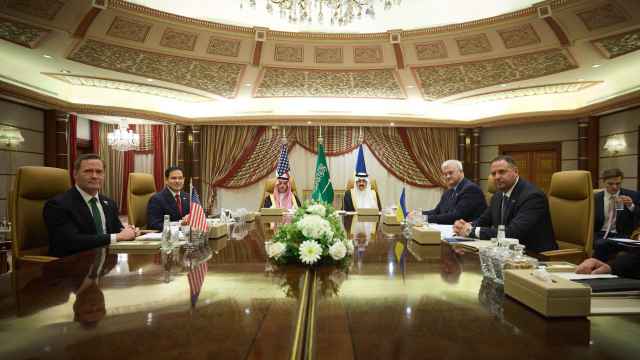Membership in the World Trade Organization, or WTO, has increased Russia's overall economic competitiveness, Prime Minister Dmitry Medvedev said Tuesday at a review of the impact of the country's participation a year after ascension.
However, Russia needs to learn how to fully utilize the opportunities presented by membership, including conflict resolution procedures, Medvedev said. Just as there are claims against Russia, the country needs to make similar moves, he said, according to a transcript of the meeting published on the government website that reviewed the country's role in the trade body.
"If you do not resist, as a rule, you will be done with, just like anywhere else in the world," Medvedev said, echoing comments by Basic Element founder and RusAl CEO Oleg Deripaska, published in The Financial Times earlier this month, where he equated joining the WTO to swimming in a pool full of sharks.
However, despite a number of hiccups in the course of the first year of WTO membership and accusations of failing to comply with all the rules imposed by the organization, the Russian economy has benefited from the experience, Medvedev said.
"These are no more than teething problems. Russia remains committed to the terms of membership, and I do not expect any serious problems, despite the calls from some industries or opposition politicians to renegotiate," said Chris Weafer, senior partner at Macro Advisory.
"The bleak picture that had been painted for certain industries was of a speculative character and has nothing to do with the current situation," Medvedev said, possibly referring to the predictions that the entry into the WTO would cost the economy $14 billion in lost revenue in the first two years. It had also been expected that food and light industry manufacturers would face immediate pressure from increased competition.
"The main positive effect of Russia's ascension to the WTO is the overall increase in the competitiveness of our economy," Medvedev said. It will take time before these changes can actually affect the economy, he added.
Some macroeconomic analysts disagree. Because Russia's membership at the WTO resulted in dramatically increased food and machinery imports, it negatively affected local producers, Daniil Markelov, an analyst from Investcafe said.
For example, the price on pork dropped by 30 percent, he said, because of increased imports of inexpensive meat, making domestic pork production less competitive.
The agricultural machinery and transportation sectors felt pressure from WTO membership. Russia introduced a recycling fee on all imported vehicles, but the move resulted in a claim by the European Union that the fee unfairly favored domestic manufacturers.
Last week President Vladimir Putin signed a law balancing the situation and applying the fee across the board, regardless of place of origin. The Industry and Trade Ministry, however, has developed a plan to subsidize domestic car manufactures to keep the sector competitive.
It is important to remember that the main lobbyists for WTO membership were the oil, chemical and metallurgical companies, Markelov said. Since the products from this sector are export oriented, these companies intended to use membership in WTO as a way to enter new markets.
"Ascension to the WTO, in general, has lead to the reduction of competitiveness and reduction of market share that local producers have domestically," Markelov said.
Russia's ascension to the WTO last year was a result of 19 years of negotiations. It was also expected that the membership would eventually improve Russia's business environment and help domestic companies to become more competitive on the global market, adding a 0.5 percent addition to annual GDP growth, according to an estimate by the Moscow New Economic School. At the same time, the World Bank estimated that being in the WTO would boost the Russian economy an additional 3.3 percent, adding $65 billion over the first three years.
Contact the author at g.moukine@imedia.ru
A Message from The Moscow Times:
Dear readers,
We are facing unprecedented challenges. Russia's Prosecutor General's Office has designated The Moscow Times as an "undesirable" organization, criminalizing our work and putting our staff at risk of prosecution. This follows our earlier unjust labeling as a "foreign agent."
These actions are direct attempts to silence independent journalism in Russia. The authorities claim our work "discredits the decisions of the Russian leadership." We see things differently: we strive to provide accurate, unbiased reporting on Russia.
We, the journalists of The Moscow Times, refuse to be silenced. But to continue our work, we need your help.
Your support, no matter how small, makes a world of difference. If you can, please support us monthly starting from just $2. It's quick to set up, and every contribution makes a significant impact.
By supporting The Moscow Times, you're defending open, independent journalism in the face of repression. Thank you for standing with us.
Remind me later.





